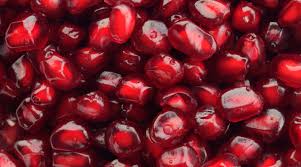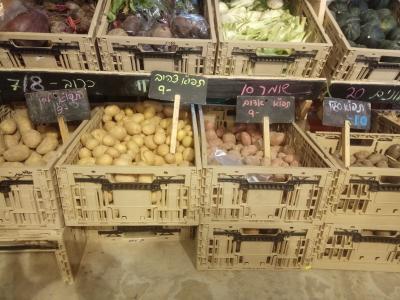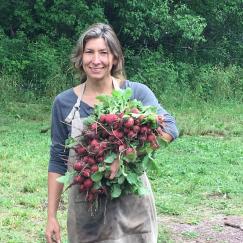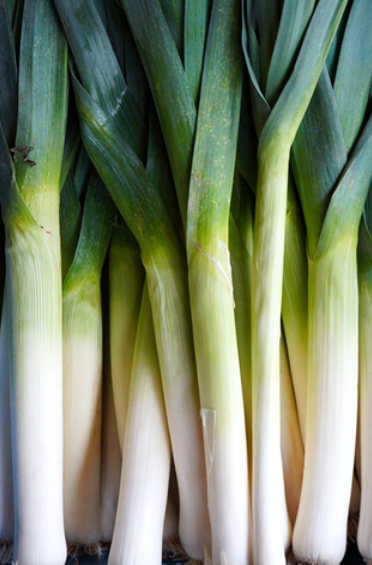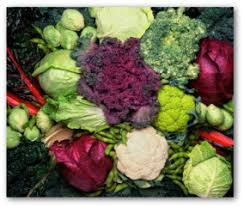עץ הרימון נתן ריחו – But who enjoys this scent, actually?
And how could it be from the Dead Sea to Jericho, when even when standing directly under the bush (bush, by the way, not tree), there is no scent at all? Poetry and artists work in mysterious ways…
Lately, pomegranates remind me of another song by a women's band called a-wa that sing in Yemenite. Yes, yes, if you've never heard them you should, they have an interesting vibe. In one of their songs, about the land of milk and honey they sing about a land abundant with wheat, and barley, and dates, and olives… and pomegranates. Pomegranate in Yemenite happens to be "Roman" – A word that crackles, full of seeds, when rolled in the mouth. Rrrrrroman. I can feel the ruby red kernels rolling on my tongue.
The pomegranate is indeed native here, one of the seven species in which our country has been blessed. We did not import it from Thailand, nor wait for explorers and conquerors to bring it in their ships. It arrived to us (and to the rest of the world as well) from our neighbors, just across the border – from the Caspian Sea in Iran, but seems to have always been part of the local landscape, holding an honorable position alongside the other produce in the market. In recent years, various scientific and medical studies have validated what the ancient Greeks and Romans already knew – that pomegranates have a wealth of properties good for our health. The Greeks and Romans praised the pomegranate as a symbol – for marriage, birth, fertility, abundance, beauty and wisdom, while in modern jargon all this is reduced to the trendy word "superfood", but the intention is clear.
The only place where the pomegranate still grows wild is its area of origin – near the Caspian Sea. But even in our region, a pomegranate shrub that began to grow and established roots – can manage well as a wild plant, not requiring close supervision. The original varieties of the pomegranate were divided into two types – the one with the dark rind and the sour kernels, and the one with the light pink rind, with sweet kernels. It is also one of the only (and possibly the only) fruits that grows "upside down", with the head and crown pointing down, with what appears to be the lower part connected to the branch.
One of the properties that make it loved by the locals is its long shelf life. During the days when there were no refrigerators, nor ice blocks, the pomegranate could be stored for a month even without refrigeration (like its other seven-specie siblings, which are also well adapted to the local climate). What is it about pomegranates thatis less loved? The work needed to get the delicious kernels out of the rind, and the fact that mistakes during the process involve a spray of juice that doesn't come off in the laundry. The common methods to overcome this problem are to de-seed (in Hebrew it's called strumming. Like playing an instrument) inside a bowl of water, which prevent the colored splashes, or by tapping the rind with a spoon to release the kernels. The most effective method, of course, is to ask someone else to do it for you…
The organicpomegranate is good for our health in many ways and forms. The Rambam recommended using it as a means to relieve headaches (probably, as a result of a hangover), to stop bleeding and treat diarrhea. Modern science has further elaborated that the organic pomegranate contains tannins that become powerful antioxidants in the body, helping it to protect itself from various cancers – breast, skin and prostate. The amount of tannins in a pomegranate is even greater than that in green tea or red wine – both recommended for moderate consumption due to their antioxidants. The same substances reduce the damage that the "bad" cholesterol causes in the body, and may therefore also help in cases of high blood pressure. And if that's not enough – drinking pomegranate juice helps boost the immune system.
As mentioned, if pomegranates are already here and are ripe and blushing red, it is a definite sign that Rosh Hashana is here.
We wish you a sweet year, abundant with good, like the kernels in the pomegranate, plenty of health and pleasure, sweet nectar and scents of fertile earth, and completely organic, without a hint of toxins.
Yours,
Maggie's Garden Team
Forecast:
In the ORGANIC vegetable baskets we expect (draft only):
Cucumber
Tomato
Lettuce
Potato
Carrot
Onion
Parsley
Pumpkin
Swiss chard
The LARGE organic vegetable baskets also include:
Eggplant
Coriander
Celrey
In the ORGANIC fruit baskets:
Sweetie
Orange
Banana
The large ORGANIC fruit baskets also include:
Pomelo
Red grapefruit
New! New! The ORGANIC Green Basket:
Swiss chard
Celery
Spinach
Basil
Dill
A kind of lettuce
Mint
Sprouts

